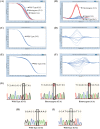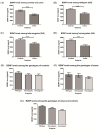Screening of brain-derived neurotrophic factor (BDNF) single nucleotide polymorphisms and plasma BDNF levels among Malaysian major depressive disorder patients
- PMID: 30677092
- PMCID: PMC6345459
- DOI: 10.1371/journal.pone.0211241
Screening of brain-derived neurotrophic factor (BDNF) single nucleotide polymorphisms and plasma BDNF levels among Malaysian major depressive disorder patients
Abstract
Background: Brain-derived neurotrophic factor (BDNF) is a neurotrophin found in abundance in brain regions such as the hippocampus, cortex, cerebellum and basal forebrain. It has been associated with the risk of susceptibility to major depressive disorder (MDD). This study aimed to determine the association of three BDNF variants (rs6265, rs1048218 and rs1048220) with Malaysian MDD patients.
Methods: The correlation of these variants to the plasma BDNF level among Malaysian MDD patients was assessed. A total of 300 cases and 300 matched controls recruited from four public hospitals within the Klang Valley of Selangor State, Malaysia and matched for age, sex and ethnicity were screened for BDNF rs6265, rs1048218 and rs1048220 using high resolution melting (HRM).
Findings: BDNF rs1048218 and BDNF rs1048220 were monomorphic and were excluded from further analysis. The distribution of the alleles and genotypes for BDNF rs6265 was in Hardy-Weinberg equilibrium for the controls (p = 0.13) but was in Hardy Weinberg disequilibrium for the cases (p = 0.011). Findings from this study indicated that having BDNF rs6265 in the Malaysian population increase the odds of developing MDD by 2.05 folds (95% CI = 1.48-3.65). Plasma from 206 cases and 206 controls were randomly selected to measure the BDNF level using enzyme-linked immunosorbent assay (ELISA). A significant decrease in the plasma BDNF level of the cases as compared to controls (p<0.0001) was observed. However, there was no evidence of the effect of the rs6265 genotypes on the BDNF level indicating a possible role of other factors in modulating the BDNF level that warrants further investigation.
Conclusion: The study indicated that having the BDNF rs6265 allele (A) increase the risk of developing MDD in the Malaysian population suggesting a possible role of BDNF in the etiology of the disorder.
Conflict of interest statement
The authors have declared that no competing interests exist.
Figures


References
-
- American Psychiatric Association. Diagnostic and Statistical Manual of Mental Disorders. 2013.
-
- Depression and Other Common Mental Disorders: Global Health Estimates. Geneva: World Health Organization; 2017. Licence: CC BY-NC-SA 3.0 IGO.
-
- Vos T, Allen C, Arora M, Barber RM, Bhutta ZA, Brown A, et al. Global, regional, and national incidence, prevalence, and years lived with disability for 310 diseases and injuries, 1990–2015: a systematic analysis for the Global Burden of Disease Study 2015. The Lancet. 2016. October 8;388(10053):1545–602. - PMC - PubMed
-
- Institute for Public Health (IPH) 2015. National Health and Morbidity Survey 2015 (NHMS 2015) Vol. II: Non-Communicable Diseases, Risk Factors & Other Health Problems; 2015.
-
- Karege F, Schwald M, Cisse M. Postnatal developmental profile of brain-derived neurotrophic factor in rat brain and platelets. Neuroscience letters. 2002. August 16;328(3):261–4. - PubMed
Publication types
MeSH terms
Substances
LinkOut - more resources
Full Text Sources
Medical

